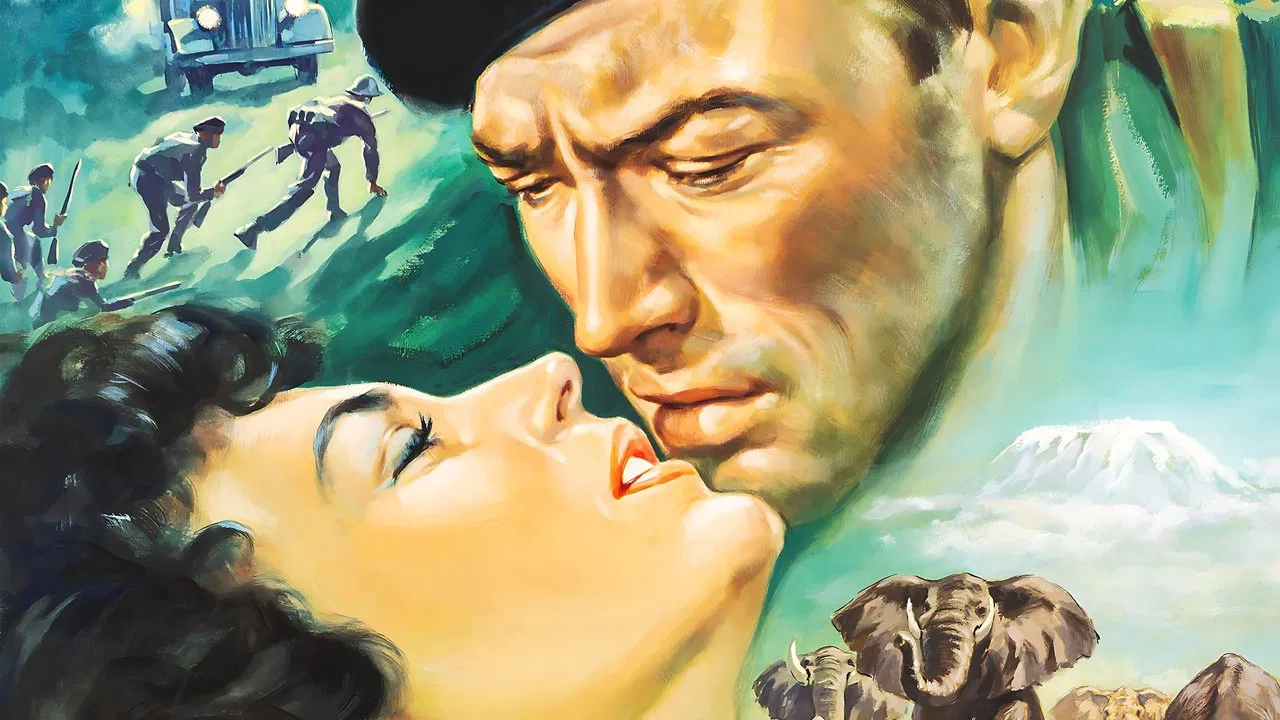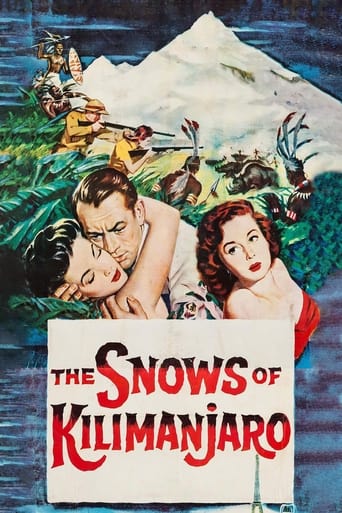

For some reason, this 'classic' popped up on my radar, perhaps whilst I was reading my Jimmy Stewart bio (Go figure). Anyway, Gregory Peck takes a role that might have better been for suited to a laconic & reflective Jimmy Stewart. He is the adventurous, Hemingway-like male author, Harry Street, reflecting on his life and loves while he convalesces from a nasty infection in his leg. Devoted wife (#3?), played by Susan Hayward attends to his wound patiently whilst the two wait for medical help to arrive, all in the shadows of the mighty Kilimanjaro.That's it. Harry marries pretty wives Ava Gardner & Hildegard Knef and mistreats both, but his career as an author takes off, allowing him a lavish lifestyle and to travel, as he pleases (with no consideration for his current wife). We see all this in a series of flashbacks. Peck plays a good role, I suppose: it's just that not much happens. There are bullfighting action, and battle scenes from the Spanish Civil War, but at a pedestrian pace. We frequently toggle back to hear frantic chat between Peck and Hayward, prompting my wife to holler, Just die, will ya?Pacing and script seemed to be lacking. I wonder why the Director chose to make such a lengthy (1:54) cut? The story could have been told in 1 1/2 hours easily, cutting oodles of empty, repetitious talk.
... View Morefor me, it is the film of a state. a state of feeling, emotion, defining of life meanings. a bitter scent. and a form of nostalgia. because, it is a trip in the past. with regrets, choices and illusions. and one of the beautiful performances of Gregory Peck. so, a confession of Hemingway, a beautiful adaptation, Ava Gardner as one of basic motifs to see it again and a story who remains, in special form, a personal one for its viewer. short, a film who must be seen time by time.
... View MoreMy only criticism of this wonderful 1952 film was that Susan Hayward did not get the Ava Gardner part. That being said, Gardner, for a change, gave a wonderful performance as the misguided wife of Gregory Peck. She was really a character out of Hemingway's "The Sun Also Rises," as well.This terrific film explores life's meaning and generally those pictures are good ones, as we saw in 1946's "The Razor's Edge."Peck plays a writer consumed with work and success. This provides tragic results with Gardner, as we see the Spanish Civil War again in Hemingway's writings.Hayward, for a change is rather subdued for Hayward. She plays Helen, his second wife, who always felt that she was in competition with his first wife.
... View MoreAt the time he was writing Ernest Hemingway was regarded as one of America's finest literary assets, and virtually all his work was given a prestigious screen adaptation at some point in the 40s and 50s. Short on action but full of introspection, often set in exotic locations, his stories typically made for slow-moving but visually stunning motion pictures."Slow-moving" and "visually stunning" could also loosely describe the style of director Henry King, who helmed this version of Hemingway's short story The Snows of Kilimanjaro. King was by no means dull, and he never got hung up on imagery, but he certainly encouraged a thoughtful style from his cast and had a love of natural beauty. His shots of the outdoors are unique; never expansive, empty landscapes but always layered, detailed compositions that show off shape and contour. There is always a sense of closeness and intimacy in King's pictures, evident from the first few shots of The Snows of Kilimanjaro – a close-up of Gregory Peck, the shadow of a tree branch sweeping across his face, cut with close-ups of him watching the flight of a vulture – a haunting and compelling introduction to the story.And Peck is very much the right man for this sort of thing – deep, serious, with an air of melancholy, but also handsome and charismatic. And of course, a very fine actor. He handles the lengthy stretches of dialogue well, putting character into Hemingway's words. And his women here are equal matches, especially Susan Hayward, who is all quiet confidence. From her voice to the way her arms lie as she sits next to Peck, everything says here is a strong-willed woman, every bit an equal partner in her relationship with Peck. And every bit an attractive woman too. One thing that The Snows of Kilimanjaro suffers from however is a lack of really outstanding supporting players.I haven't read the original Hemingway story on which this is based. Apparently the central theme is supposedly Harry Street's sense of dissatisfaction with his own writing. However, whether it is differences in this adaptation or simply my own impression of it, I was struck far more by Street's rocky love life, in particular the series of disillusioned women he leaves behind him. It is to me the epitome of 1950s melodrama, from the stabbing score of Alfred Newman to the searing shot of Peck and Ava Gardner kissing before the stark backdrop of a tree. And it seems this is how the American public saw it too. Despite its hard-going literary roots, it became the third highest-grossing picture of the year.
... View More